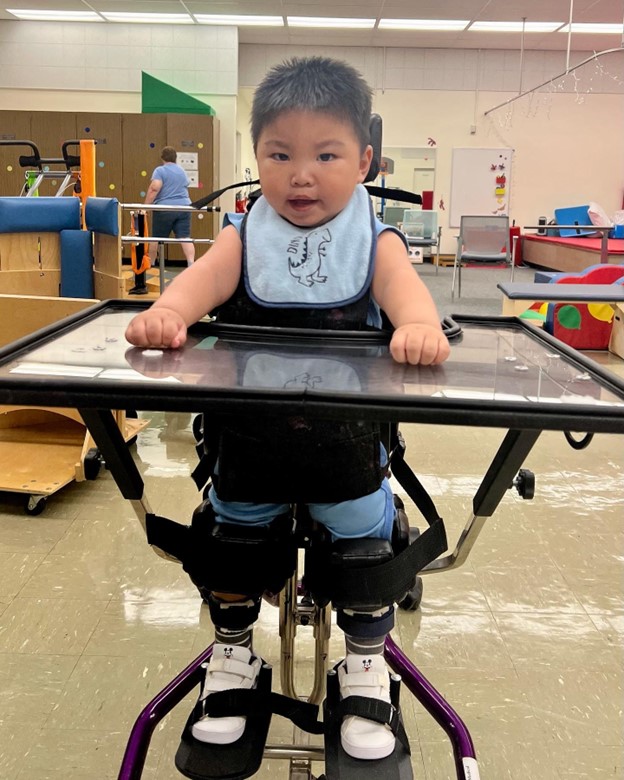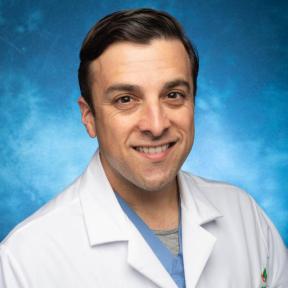At 17-months-old, Raphael was experiencing failure to thrive (FTT), a condition when a baby fails to gain weight or height at a healthy development rate. Failure to thrive can be caused by gastrointestinal issues, feeding problems, or other medical conditions.
During the first few months of life, babies gain around one ounce a day. Typically, babies put on one to two pounds during the first six months of life. From 6 to 12 months of age, babies gain about three to five ounces. According to the Centers for Disease Control and Prevention, the average male weight at 17-months-old is around 23lbs.
Raphael weighed 19lb 12oz when he first came to MemorialCare Miller Children’s & Women’s Hospital Long Beach. He was put under the care of Roy Nattiv, M.D., pediatric gastroenterologist with the Gastroenterology & Nutrition Center at Miller Children' & Women's.
Raphael was treated for swallowing difficulties (dysphagia), gastroesophageal reflux disease (GERD), and constipation. Dr. Nattiv prescribed omeprazole, a drug to treat the acid production in the stomach caused by GERD, stool softening medication to treat constipation, and a nutritional supplement to increase caloric consumption. The hope was that the treatments would allow Raphael to eat more and gain weight.
On Raphael’s next visit, he showed a decrease in weight, weighing 18lb 15oz. Ultimately, caloric needs could not be met due to the dysphagia, which based on a modified barium swallow test, showed aspiration. Aspiration from dysphagia is a condition where the airway muscles do not function properly, causing swallowing difficulties and dysfunction.
Dr. Nattiv decided that the best course to take to ensure Raphael would be receiving the nutrients he needed would be through a feeding tube (G-tube) placement. This allowed Raphael to receive liquids, consisting of a nutritional supplement to increase weight gain. Raphael was discharged the day after admission, with an improved weight to 20lb 4.5oz.
“The G-tube seemed like a great option, that way he wasn’t spending all day meeting caloric needs,” says Dr. Nattiv. “It was an immediate game changer because he was able to spend time with family, meet nutritional goals and prevent oral aversion.”
Raphael continued to improve under this feeding regimen. A few months after the G-tube placement, Raphael’s weight improved so much that he was no longer considered Failure to Thrive. He weighed 26lb 1oz, placing him in the 41% weight percentile.
Now that Raphael is no longer considered Failure to Thrive, Dr. Nattiv is working on Raphael’s oral intake development. He began seeing an occupational care team through the Rehabilitation Center at Miller Children's & Women's earlier this year and continues to be fed through a G-tube at 25-months old.
The Gastroenterology & Nutrition Center at Miller Children’s & Women’s is a California Children’s Services (CCS) approved Special Care Center (SCC) for gastrointestinal disorders, providing a comprehensive and specialized approach for diagnosis and treatment of children with complex liver, nutritional, and gastrointestinal conditions. The center offers a variety of services, including a gastrointestinal lab and motility program that provides treatment to neonates, infants, pediatric and adolescent patients. Miller Children’s & Women’s is one of the few hospitals in the area to perform impedance studies and utilize the Bravo Implantable pH Probe, which provides a more comfortable way to diagnosis GERD compared to catheter-based pH monitoring systems.
Raphael’s family commends Dr. Nattiv and his care team for being the best providers for their son and helping them through every step of this process from how to administer his medications to properly managing his food intake via a G-tube at home.
“It’s important to find a pediatric gastroenterologist that will go over all the options with the family and will work with the family to make sure they receive all the therapy they need and ween off if possible. Tube feeding can seem unnatural, the mental leap can be challenging, so it’s important to hold the family’s hand through the process and be reassuring,” continued Dr. Nattiv.

